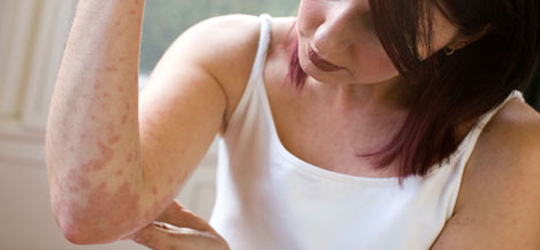{SCA}Eczema is also known as dermatitis. It is a term used to describe a group of dry skin conditions that can affect any age group. This skin problem is not contagious and although there are treatments, there is no cure. Generally, it is characterized by itchy red skin with tiny bumps or blisters and inflammation. Over time the untreated condition will lead to skin that is thick, scaly and dry. There may also be hair loss in the affected areas and changes in the colour of the skin.
Eczema Causes and Types
An individual may experience several different types of eczema. The causes and treatments will vary depending of which type the individual is suffering from.
- can affect all age groups, although generally starts at a young age (around 20% of children younger than 6 months have this skin problem.
- most common type and affects about 10% to 20% of the population.
- it is hereditary or in other words, children whose parents have atopic eczema are more likely to develop it themselves.
- closely associated with other health problems such as asthma, allergic rhinitis and hay fever.
- it is suspected that individuals with atopic eczema are more sensitive to allergens such as dust, dust mites, pet dander, pollen, moulds, and certain foods.
- other triggers can be stress, sweating, or exposure to hot or cold temperatures.
- common symptoms are severe itchiness (pruritis), dry and cracking skin, sore sensitive skin, red to brownish-grey blistery skin, and inflammation.
- symptoms usually come and go.
- skin may also become thick and leathery.
- all areas of the body can be affected, especially skin folds, the back of knees and elbows, neck, wrists, ankles, and face.
- infection commonly occurs as a result of scratching opening up the skin surface.
- in about half of the infant cases, the condition disappears by a year and half in age.
- usual treatments include emollients in order to hydrate the skin and steroids to reduce inflammation.
- to reduce the effect of dust mites triggering the eczema, plastic mattress pads should be used on the bed, regular vacuuming of curtains and rugs and damp dusting is necessary.
- altering the diet may be necessary when the trigger is an allergy to food.
Home Remedies for Eczema
Home remedies for eczema may be as simple as changing your laundry detergent or as difficult as moving to a new climate or changing jobs. Removing whatever is causing the allergic reaction is the easiest and most effective treatment.
Prevent dry skin by taking warm (not hot) showers rather than baths. Use a mild soap or body cleanser. Dry yourself very carefully and apply moisturizing skin lotions all over your body. Avoid lotions with fragrances or other irritating substances.
- Avoid wearing tight-fitting, rough, or scratchy clothing.
- Avoid scratching the rash. If you can’t stop yourself from scratching, cover the area with a dressing. Wear gloves at night to minimize skin damage from scratching.
- Anything that causes sweating can irritate the rash. Avoid strenuous exercise during a flare.
If the allergy-causing agent cannot be removed or identified, the next step is to lessen the allergic inflammatory response.
- Apply a nonprescription steroid cream (hydrocortisone) along with anti-itching lotion (menthol/camphor, such as calamine). The cream must be applied as often as possible without skipping days until the rash is gone.
- Diphenhydramine ( Benadryl) in pill form may be taken for the itching. Caution – you should not take this medication if you need to drive a car or operate machinery as it will make you sleepy.
- Clean the area with a hypoallergenic soap every day. Apply lubricating cream or lotion after washing.
Avoid physical and mental stress. Eating right, light activity, and adequate sleep will help you stay healthy, which can help prevent flares.

